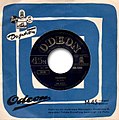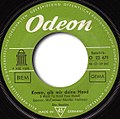Odeon (record label)


Odeon is the brand name registered in the Berlin Commercial Register in 1903 of the International Talking Machine Company founded in the same year by the American Frederick M. Prescott in the Weissensee district for the production of gramophones and records .
history
The name was chosen by Prescott, who had previously been Managing Director of the International Zonophone Company in Berlin, and his authorized signatory Richard Seligsohn with consideration for the French investors, the musical instrument makers Charles and Jacques Ullmann , and refers to the famous Parisian Odeon Theater . A characteristic feature of the label, which was colored differently depending on the price range, was the "Odeon temple".
In 1904, the company released the first double-sided record, for which it tried in vain to enforce exclusive rights, and enlarged the records from 18 centimeters to 25 and 30 centimeters in diameter. As a result, playing times of up to five and a half minutes were achieved. Odeon developed into one of the main players on the international record market and also sold recordings with non-European music. In the founding year, sound engineer John Daniel Smoot traveled to North Africa, Greece and Turkey to make recordings there. Excursions to Latin America and India followed. In 1906 the Odeon repertoire recorded 11,000 titles with " world music ".
In addition to Odeon, the International Talking Machine Company also included the brands Fonotipia , Jumbo and Jumbola . Because product pirates copied the plates by galvanically removing pressing tools, the International Talking Machine Company protected their plate brands with a trick: roughly in the middle of each plate they cut a groove at a greater distance. Odeon and other records could be distinguished from the outside.
The most famous artists that Odeon signed include tenor Richard Tauber , soprano Amalia Carneri , Zarah Leander and Leo Fuld , the emperor of the Yiddish song . The Comedian Harmonists released their first records at Odeon before signing an exclusive deal with Electrola . In 1911 the company became a subsidiary of Carl Lindström AG, which in turn was eventually merged into the EMI group. Odeon, however, remained as a separate brand until the end of the record as a mass media carrier. The Beatles also appeared for a time with the Odeon label.
In October 2018 the label was revived with the album release "Randale & Hurra" by the band Querbeat .
Odeon Swing Music Series
The music label Odeon published a jazz anthology in 1938, which included American hot and sweet recordings by the Okeh and Parlophone labels from 1927 to 1935. The only exception were two tracks ("Blue Strings" / "Keep Goin '") by the Bert Firmin orchestra in a contemporary British recording. Despite all the "undesirability of swing and non-Aryan music", the Lindström Society started its series during this time, which comprised 91 records (or 182 tracks). Lindström had already published American jazz music in the twenties with his legendary American Record series.
Originally only intended for export, the leading record stores soon had hand-stencil copies of directories available, which made it possible for interested customers to place an order. However, the records were not allowed to be listened to in public, even when they were bought in the shop. The Odeon Swing Music Series was congruent with parts of the British Parlophone First New Rhythm Style Series and individual recordings of the Parlophone Second New Rhythym Style Series , e.g. T. also the Parlophone 1934 Rhythm Style Series .
In the opinion of jazz historian Horst Heinz Lange , the Odeon Swing Music Series was “probably the most perfect pure jazz recordings series ever released on '78 ' shellac records in Germany .” The series was launched in 1937 and was - although for the most part pressed for export - also available in major German record stores. You could order these plates without difficulty until the beginning of the war - sometimes even later - in the shops that bore the imprint typical of the time:
“Since swing music is a non-German type of dance music , we have not included this series in our German repertoire. We do not want to fail to make these records accessible to interested parties of our customers. Here we started from the idea that the term 'swing music' is not correctly interpreted in many circles and that it can only be corrected on the basis of typical record examples. These numbers from the American repertoire provide the best opportunity for this. "

The records were sold in a special sleeve with a typically dark red-violet colored print. The design by the Berlin artist Kruse (alias Robinson ) showed a skyscraper street view, which was supposed to create an association between swing music and modern city life. Some sleeves did not have Swing Music imprinted on them. The others show it in the so-called “German handwriting”.
The series began with the "West End Blues" from Louis Armstrong's Hot Five from 1928, coupled with "Freeze an 'Melt" by the Eddie Lang Orchestra. This was followed by recordings of Jimmy and Tommy Dorsey , Earl Hines , the Chocolate Dandies , Duke Ellington , Joe Venuti , Frankie Trumbauer , McKenzies and Condons Chicagoans , Miff Mole , Jack Purvis , Seger Ellis , Luis Russell , Cornell Smelser , " The Harlem Footwarmers " , " OK Rhythm Kings ", the pianist Jimmy Johnson, Jess Stacy , Jimmie Lunceford , Mildred Bailey , Gene Krupa , Emmett Miller and His Georgia Crackers, Garland Wilson , Bert Firman's Quintuplets of Swing, Bix Beiderbecke and the Coleman Hawkins Quartet (with " Lady, Be Good “1934).
The Odeon Swing Music Series published its last catalog for Europe in November 1939. The ongoing A 286.000 series of the German Odeon ended with the order number A 286.092, with "Since My Best Girl Turned Me Down" by Bix Beiderbecke, coupled with "Jubilee" by Frankie Trumbauer and His Orchestra. The series was not continued thereafter, but all recordings appeared in later editions and were sold until the end of the war.
The "Odeon Swing Music Series" appeared on LP , on EMI-Electrola in the 1970s (Vol. 1–13).
literature
- Alfred Gutmann (Ed.): 25 years of Lindström 1904 - 1929 . Berlin: Lindström 1929
- Horst Wahl: ODEON, the story of a record company . Düsseldorf: Seven 1986
- Hans Peter Woessner and Frank Erzinger: The record company ODEON in Switzerland (1904–1928) . Zurich 1993
Shellac record with Dajos Béla , 1929
Shellac record, with Richard Tauber , 1932
Shellac record with Zarah Leander , 1937
Single with Earl Bostic , 1954
Single Come on, give me your hand with the Beatles , 1964
Web links
- History and discography of the Odeon Swing Music Series at Swingtime
- Odeon Swing Music Series at Discogs
Individual evidence
- ↑ Querbeat | Begin. Accessed November 20, 2018 (German).
- ^ Horst Heinz Lange Jazz in Germany: the German jazz chronicle up to 1960 . G. Olms, 1996
- ↑ America Euphoria - America Hysteria: Popular music made in USA as perceived by Germans 1914-2014 , edited by Michael Fischer, Christofer Jost. Münster, New York: Waxmann, 2017, p. 116
- ↑ Odeon Swing Music Series at> Swingtime
- ↑ a b Horst H. Lange, Liner Notes to: Odeon Swing Music Series , Vol. 13. EMI-Electrola.





